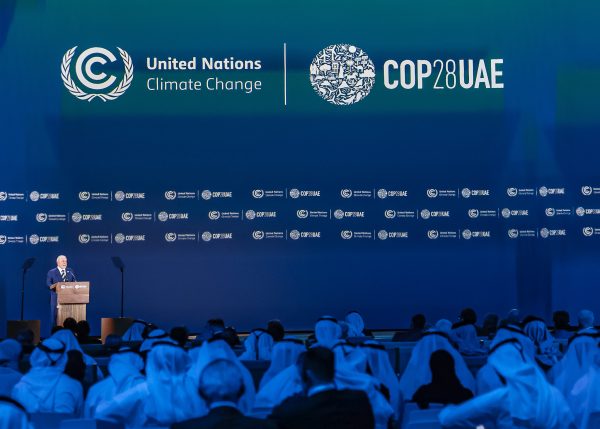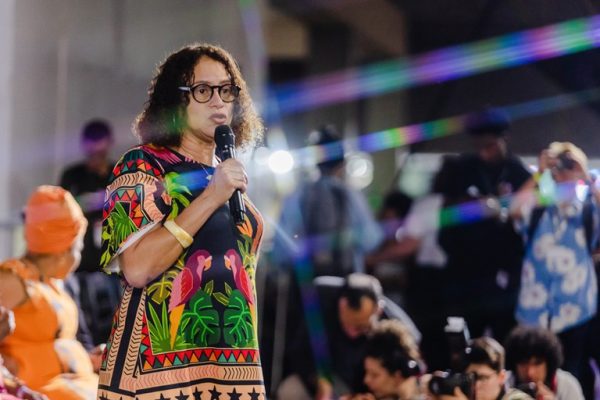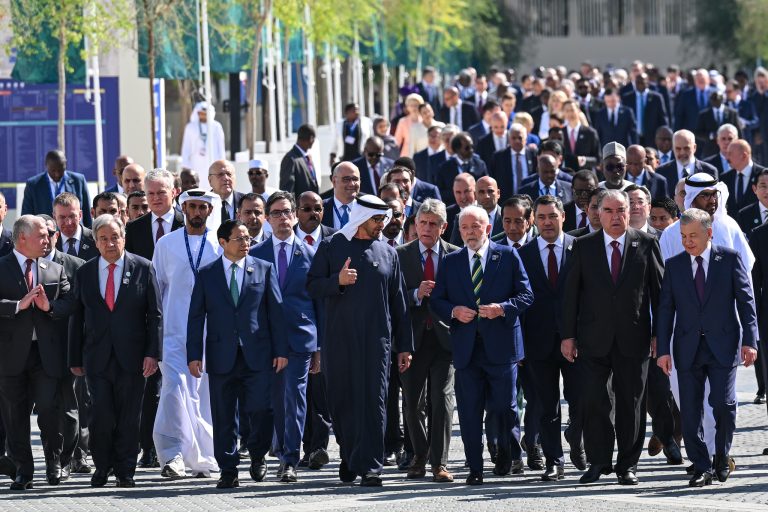Dubai – Adjustments to climate targets, the pledge to reach zero deforestation in the Amazon by 2030, a green plan and other environmental actions were topics of the speeches of Brazil’s President Luiz Inácio Lula da Silva on Friday (1st) at the opening and first session of the High-Level Segment for Heads of State and Governments of the UN climate summit COP28 in Dubai. Pictured above, Lula with the leaders at the COP28 session.
He said that Brazil’s climate targets are now more ambitious than most developed countries’ and that the green plan launched earlier today by ministers Fernando Haddad of finance and Marina Silva of environment and climate change will foster green industrialization, low-carbon agriculture, and bioeconomy. Lula also spoke of the work groups with the Amazonian countries and other tropical forest-holding countries.

“The world is already convinced of the potential of renewable energies. Now it’s time to discuss how slowly the decarbonization of the planet has gone and to work towards an economy that’s less reliant on fossil fuels. We have to carry it out urgently and fairly,” he emphasized.
Lula wants to work constructively with all countries to pave the way between this COP28 and the COP30 to be hosted in the Brazilian Amazon city of Belém, Pará, in 2025.
“There aren’t two planets Earth. We’re only one species called humanity,” stated the Brazilian head of state, who said we’re “facing what may be the largest challenge ever faced by humankind.”
The path from COP28 to Brazil’s COP 30 will dictate the future, said the president. This will see the first global stocktake of the Paris Agreement, while the COP29 will set a new quantified goal on climate finance.
“And in Belém, we’ll establish new nationally determined contributions (NDC),” he said. Brazil has adjusted its NDC and pledged to cut 48% of its emissions by 2025 and 53% by 2030 and reach carbon neutrality by 2050, according to Lula. “Our NDC is more ambitious than those of several countries that have polluted the atmosphere since the industrial revolution in the nineteenth century,” he said.
The president reaffirmed the pledge to zero deforestation in the Amazon by 2030. “We’ve already managed to cut it by 50% in the first ten months of the year, preventing the emission of 250 million tonnes of carbon into the atmosphere,” he said.
Lula believes that the climate emergency is a reality in Brazil. “The Amazon region at this moment is going through an unprecedented drought. The level of the rivers is the lowest in over 120 years. I never thought I’d see this where the world’s largest freshwater reserves are,” he said.
But even if no tree is cut down from now on, the president said, the Amazon could reach its tipping point if other countries don’t play their part. “Deforestation worldwide only accounts for 10% of global emissions. The rise in global temperature could trigger an irreversible savannization of the Amazon. Energy, industry and transportation sectors emit too many greenhouse gases. We have to deal with all these sources,” he said.
Lula presented the Mission 1.5 of Brazil. “A collective mission to keep us on the path of 1.5° C. In the two years ahead of the COP30, we will have to double efforts to implement the NDCs we pledged. And in Belém, we will have to announce more daring NDCs and ensure the means necessary to implement them,” he said.
Green Plan
The Green Plan was launched by ministers Fernando Haddad and Marina Silva on Friday (1)’s afternoon in the Global Climate Action of the Expo City where the COP28 is being held. According to Haddad, the plan offers “a more ambitious but realistic model to reinvent Brazil.”
He said that nearly one hundred initiatives will be launched ahead of the COP30 in 2025, and many are already being implemented. “Some examples will be the creation of a well-regulated carbon market, the emission of green bonds, the establishment of a national taxonomy focused on sustainability, and the revision of our Climate Fund,” he said.

According to Haddad, these initiatives aim to create the conditions for a new wave of investments, which will have as its primary goal the technological consolidation of the industry, qualification of the workforce, and modernization of science and technology in Brazil.
The minister reported that in recent days, the Brazilian Congress passed bills on green hydrogen and offshore wind energy generation, “two key sectors of the energy transition in which Brazil holds enormous potential.”
According to Haddad, private sector studies indicated that ecological transformation could create 7.5 to 10 million jobs and opportunities to generate income. The jobs created would be in all sectors, but mainly in the bioeconomy, agriculture, and infrastructure.
But to seize this opportunity, the same studies estimated Brazil would need additional investments of around USD 130 billion to USD 160 billion per year over the next ten years, mainly in infrastructure for adaptation, energy, industry, and mobility.
Investment programs
The minister of Science, Technology and Innovation, Luciana Santos, who is part of the Brazilian delegation at COP28, launched this Friday (01) financing projects focused on the energy transition worth BRL 21 billion (about USD 4.26 billion at the current rate).

Investments will be in areas aimed at developing the Brazilian sustainable economy. “There are five public grants, all focused on the energy transition debate. We cannot face global warming and climate change without science and technology,” she declared.
The five public notices are part of the Mais Inovação Brasil program, an initiative of the country’s new industrial policy and a joint initiative between the ministries of Science, Technology and Innovation, Development, Industry, Commerce and Services, the Financier of Studies and Projects (Finep) and National Bank for Economic and Social Development (BNDES).
Translated by Guilherme Miranda & Elúsio Brasileiro




